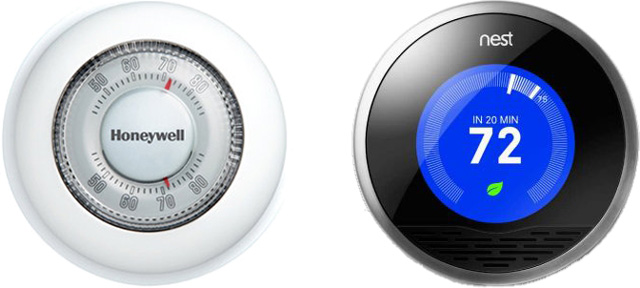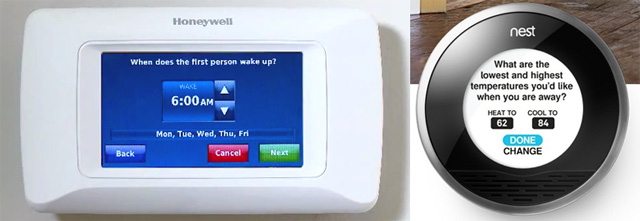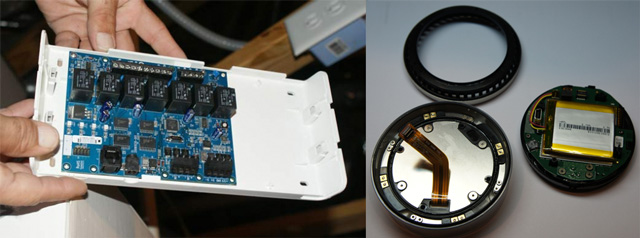
Honeywell filed a multi-patent infringement lawsuit against Nest Labs and Best Buy yesterday. The suit alleges that Nest Labs is infringing on seven Honeywell patents. Honeywell is not seeking licensing fees. The consumer electronic conglomerate wants Nest Labs to cease using the technology and is actually looking to collect damages caused by the infringement. Damages? Bullshit. This is about killing the competition.
This lawsuit hit Silicon Valley and the tech world hard when it broke Monday morning. Nest Labs is the Valley’s star child right now. The company, founded by the godfather of the iPod, started in a Palo Alto garage just over two years ago and successfully disrupted a stale industry so hard that it seems to have resulted in a major lawsuit. The company won a Best of Innovations Award at CES 2012 and, just last week, a Crunchie for Best New Device. People love Nest. And now most of those same people hate Honeywell.
Honeywell has every right to protect their intellectual property. In their defensive, Nest Labs is clearly riffing off of Honeywell’s iconic round thermostat design. Honeywell’s T87 thermostat is undeniably, instantly recognizable as a thermostat. But so is a Kleenex box. And a Frisbee. Shame on Nest Labs if the Nest Learning Thermostat was intentionally developed from Honeywell’s intellectual property. But from where I sit Nest Labs is simply trying to advance the thermostat using novel features in a familiar design.

The suit alleges Nest Labs infringes on several of Honeywell’s patents involving thermostats. Several, like 7159789 and 7159790, involve the round hardware mechanism, rotating dial and center screen placement. Others, namely 7142948 and 7634504, covers the user interface. Natural language installer setup for controller (7634504) allows for a graphical user interface that sets up the device through a series of simple questions like, “On weekdays, is someone home all day?” and “What is a comfortable sleeping temperature in the summer?” You see, the Nest also has a friendly user interface. Apparently Honeywell is the only one allowed to have a round, rotating idiot-proof thermostat.
Honeywell has been selling thermostats for years but none, including the company’s very pricey Prestige line, match the Nest’s build quality or user interface. I spent a considerable amount of time shopping for a thermostat last year. Out of the six or so Honeywell models I tried, all were cheaply made and featured piss-poor UIs. I literally punched my wall after becoming so frustrated with one of the Prestige models.

The difference between a Honeywell thermostat and the Nest is striking. One is a cheap, clearly mass-produced hunk of plastic and the other is something you would be proud to own. This feeling is exactly why this lawsuit reeks of greed. Honeywell is embarrassed, perhaps even slightly frightened, by an upstart that is managing to get people excited about thermostats.
Honeywell clearly knows what they’re doing. While it’s easy to throw up your hands in disgust, Honeywell is operating within their rights. A quick run-through of the patents revels that the Nest Learning Thermostat is seemingly infringing on all seven. Some are trivial like the four aforementioned patents but the others are a bit more substantial and detailed. Patent 7476988 Power Stealing Control Devices lists the process required to leech the thermostat’s power from another source and store it in a battery, capacitor or the like. But it’s not my job to decide which claim has merit. It’s the hands of the courts now.
This lawsuit hit Silicon Valley and the tech world hard when it broke Monday morning. Nest Labs is the Valley’s star child right now. The company, founded by the godfather of the iPod, started in a Palo Alto garage just over two years ago and successfully disrupted a stale industry so hard that it seems to have resulted in a major lawsuit. The company won a Best of Innovations Award at CES 2012 and, just last week, a Crunchie for Best New Device. People love Nest. And now most of those same people hate Honeywell.
Honeywell has every right to protect their intellectual property. In their defensive, Nest Labs is clearly riffing off of Honeywell’s iconic round thermostat design. Honeywell’s T87 thermostat is undeniably, instantly recognizable as a thermostat. But so is a Kleenex box. And a Frisbee. Shame on Nest Labs if the Nest Learning Thermostat was intentionally developed from Honeywell’s intellectual property. But from where I sit Nest Labs is simply trying to advance the thermostat using novel features in a familiar design.

The suit alleges Nest Labs infringes on several of Honeywell’s patents involving thermostats. Several, like 7159789 and 7159790, involve the round hardware mechanism, rotating dial and center screen placement. Others, namely 7142948 and 7634504, covers the user interface. Natural language installer setup for controller (7634504) allows for a graphical user interface that sets up the device through a series of simple questions like, “On weekdays, is someone home all day?” and “What is a comfortable sleeping temperature in the summer?” You see, the Nest also has a friendly user interface. Apparently Honeywell is the only one allowed to have a round, rotating idiot-proof thermostat.
Honeywell has been selling thermostats for years but none, including the company’s very pricey Prestige line, match the Nest’s build quality or user interface. I spent a considerable amount of time shopping for a thermostat last year. Out of the six or so Honeywell models I tried, all were cheaply made and featured piss-poor UIs. I literally punched my wall after becoming so frustrated with one of the Prestige models.

The difference between a Honeywell thermostat and the Nest is striking. One is a cheap, clearly mass-produced hunk of plastic and the other is something you would be proud to own. This feeling is exactly why this lawsuit reeks of greed. Honeywell is embarrassed, perhaps even slightly frightened, by an upstart that is managing to get people excited about thermostats.
Honeywell clearly knows what they’re doing. While it’s easy to throw up your hands in disgust, Honeywell is operating within their rights. A quick run-through of the patents revels that the Nest Learning Thermostat is seemingly infringing on all seven. Some are trivial like the four aforementioned patents but the others are a bit more substantial and detailed. Patent 7476988 Power Stealing Control Devices lists the process required to leech the thermostat’s power from another source and store it in a battery, capacitor or the like. But it’s not my job to decide which claim has merit. It’s the hands of the courts now.
I spoke with Matthew Mitchell, Esq. of Mitchell Law PLLC regarding Honeywell’s claims. He pointed out that Nest could have simply overlooked the patents listed here. Or, as he assumes is more likely, the company was aware of these and already have a litigation strategy ready to argue that the patents are invalid.
Patents are intended to protect non-obvious ideas while advancing general innovation. Mitchell later pointed out, “Patents are the great equalizer. Patents enable garage inventors and small startups (some of which are referred to derogatorily as: non-practicing entities or ‘trolls’) to compete with the big boys like Honeywell.” If the case was reversed, if Nest was suing Honeywell, the tech press’ knee-jerk reaction would have been different, but still likely siding with the little guy.
It will be up to the courts whether Honeywell’s claims have merit and the company is due damages, but unfortunately the only winner in this case will be the legal teams. Nest Labs will likely spend money earmarked for R&D/marketing on a defense. Honeywell’s image is tarnished.
But worse yet, the consumer will lose the most if a novel startup like Nest Labs is sued out of existence.

No comments:
Post a Comment